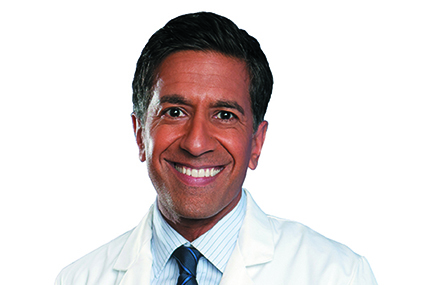Sanjay Gupta, MD
Everyday Health
2001–present
Chief Medical Correspondent, CNN
2001–present
Assistant Professor, The Emory Clinic/Emory University School of Medicine
2001–present
Associate Chief of Neurosurgery, Grady Memorial Hospital, Atlanta, GA
Dr. Sanjay Gupta’s first day onsite at Everyday Health was not a slow news day.
It was April 26, and Defense Secretary Chuck Hagel had just announced that the US had evidence of the use of sarin gas in Syria. Dr. Gupta, who covered the war in Iraq for CNN in 2003, has considerable expertise on the topic of chemical weapons and that, along with his cable news pedigree, meant he was in demand. That’s the downside of being the world’s foremost celebrity medical journalist, but it’s okay by Gupta, who’s happiest when he’s up to his eyeballs in work and passionate about public health.
“If we’re serious about creating a healthier America, which is what everyone talks about, then arming people with the right knowledge to do that is really important,” said Gupta, plopping down at a desk between giving interviews about the nerve gas. He was wearing a Nike FuelBand on one wrist and a Fitbit on the other. “You can tell people to eat right and exercise, or to live a healthy lifestyle, but a lot of people don’t know precisely what that means. And that includes a lot of people in the medical community. A place like Everyday Health seems like they have a real shot at being able to close that gap a bit.”
Gupta calls Atlanta home, but is a frequent visitor to New York, where Everyday Health is based. He joined the company in March and will continue to work for CNN and CBS News’ 60 Minutes while producing articles, video segments and two daily newsfeeds for both EverydayHealth.com and MedPageToday.
He sees his work at EverydayHealth occupying a point between breaking news and wellness-oriented lifestyle features.
“The conversation is not so much ‘Here’s the news today,’ nor is it ‘You need to eat your broccoli,’” he says. “It’s more ‘Look, there are things happening in the world every day that can improve your health and make you live a more joyful life.’ You may not know what they are, but we do, and it’s our job to tell you that.”
Gupta’s also keen to change the way medical news is reported to healthcare professionals. “It’s a remarkably archaic system,” he says. “I’m mystified by it, considering how technologically sophisticated we are.”
Medical news has become overly specialized, says Gupta, but there are news items that all doctors should know. “It’s not like an orthopedic surgeon can’t know anything about the heart,” he says.
Gupta’s answer is the Gupta Guide, a daily medical news cheat sheet for the harried doctor which appears on MedPage Today.
“It’s like if you’re on vacation, and you stay at a hotel, and you don’t have all day to read the New York Times because the kids are yelling at you to jump in the pool,” quips Gupta (he and his wife have three daughters, ages 4, 6 and 8). “I want to be able to spend 10, 15 minutes reading this and feel like I have good knowledge of what’s happening.”
The son of a pair of engineers, Gupta was drawn to medicine from around age 12, when he spent a lot of time at the hospital, visiting his ailing grandfather. He went to medical school—first for pediatrics, then for neuroscience—and indulged his second love, writing, in his spare time, penning think pieces on health policy long before the likes of Ezra Klein and Jonathan Cohn strode the media landscape. His writing caught the attention of the Clinton Administration and landed him a stint as a speechwriter for Hillary Clinton. Shortly after moving to Atlanta, where he teaches at Emory and practices at Grady Memorial, he bumped into a CNN exec he’d known from his days with the White House, who hired him to help launch the cable network’s medical desk. He’s been juggling medicine and reporting ever since—sometimes doing both at once, as in Iraq, where he was called on to perform life-saving brain surgery five times in battlefield ORs.
“I do see media as an opportunity to provide a really significant public health service,” says Gupta, “but if I’m off covering a story in Iraq or Haiti or someplace like that, I’m a doctor first.”
From the June 01, 2013 Issue of MM+M - Medical Marketing and Media








